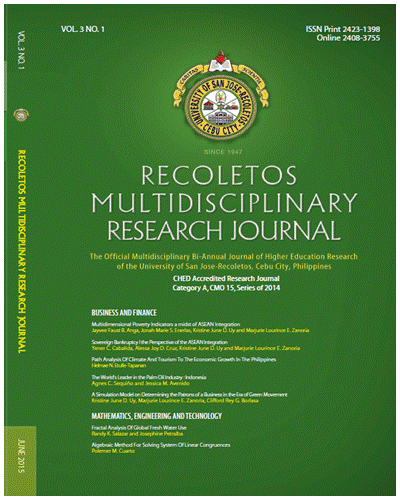Responding to the Challenges Of Employment Through Graduate Attributes
DOI:
https://doi.org/10.32871/rmrj1503.01.10Keywords:
Extent of Practice, Employment, Graduate AttributesAbstract
Responding to the challenges of global employment, universities recognize the need to produce graduates who meet the ever-changing demands of work and life in the national and global environment. This paper investigates the extent of practice of graduate attributes among graduating college students of a Catholic University. It determines the influence of graduate attributes in students’ lives. Using a sequential explanatory mixed-method design, the findings revealed that the participants developed the graduate attributes to a high extent. Remarkable implication signifies that university education has successfully prepared and trained students to meet the challenges of national and global employment and industry.
References
Altbach, P.G. & Knight, J. (2007).The Internationalization of Higher Education.Journal of Studies in International Education, 11(3/4), 280-305. doi: 10.1177/1028315307303542
Badock, P., Pattison, P., & Harris, K. (2010). Developing generic skills through university study: a study of arts, science and engineering in Australia. Studies in Higher Education, 60(4), 441-458. doi: 10.1007/s10734-010-9308-8
Barnett, R. & Coate, K. (2008).Engaging the Curriculum in Higher Education. British Journal of Educational Studies, 56(2), 234-235. doi:10.1111/j.1467-8527.2008.00402_3.x
Barrie, S. (2006). Understanding what we mean by the generic attributes of graduates? Studies in Higher Education, 51(2), 215-24, 2006.doi: 10.1007/s10734-004-6384-7
Bath, D., Smith, C., Stein, S., & Swann, R. (2004). Beyond mapping and embedding graduate attributes: bringing together quality assurance and action learning to create a validated and living curriculum. Higher Educational Research and Development,23(3), 313-328. doi: 10.1080/0729436042000235427
Biggs, J. & Tang, C. (2012).Teaching for quality learning at university. British Journal of Educational Technology, 43(3), E94-E95.doi: 10.1111/j.1467-8535.2012.01317_3.x
Bowden, J., Hart, G., King, B., Trigwell, K., & Watts, O. (2000).Generic capabilities of ATN university graduates. Canberra: Australian Government Department of Education, Training and Youth Affairs. Retrieved from http:/www.clt.uts.edu.au/atn.grad.cap.project.index.html
Clanchy, J. and Ballard, B. (1995).Generic skills in the context of higher education. Higher Education Research and Development, 14 (2), 155–166. doi: 10.1080/0729436950140202
Cohen, L., Manion, L. & Morrison, K. (2007).Research Methods in Education, (6thed.). Madison Avenue, NY: Routledge.
Creswell, J. W. & Clark, V. (2011).Designing and Conducting Mixed Methods Research, (2nd ed.). USA: Sage Publications, Inc.
De Guzman A. & Castro B.(2008).Employment and employability profile of a select group of Filipino college graduates. KEDI Journal of Educational Policy, 5(1), 63-82. Retrieved from http://eng.kedi.re.kr
Drummond, I, Nixon, I & Wiltshire, J. (1998). Personal transferable skills in higher education: the problems of implementing good practice. Quality Assurance in Education, 6(1), 19-27. doi: http://dx.doi.org/10.1108/09684889810200359
Felder, R. & Brent, R. (2003). Designing and Teaching courses to satisfy the ABET Engineering criteria, The Research Journal of Engineering Education, 92(1), 7-25. doi:Â 10.1002/j.2168-9830.2003.tb00734.x
Harvey, L., Locke, W., & Morey A. (2002).Enhancing employability, recognizing diversity. London: Universities UK-CSU.
Herok, G.H., Chuck, J. & Millar, T.J. (2013). Teaching and Evaluating Graduate Attributes in Science Based Disciplines. Creative Education, 4(7B), 42-49. doi:Â 10.4236/ce.2013.47A2008
Jones, A. (2009). Generic attributes as espoused theory: the importance of context. Higher Education, 58(2), 175-191. doi 10.1007/s10734-008-9189-2
Kember, D. (2008). Nurturing generic capabilities through a teaching and learning environment which provides practice in their use. Higher Education, 57(1), 37-55. doi 10.1007/s10734-008-9131-7
Killick, D. & Dean, L. (2013). Embedding internationalization and employability through graduate attributes. BrookeseJournal of Learning and Teaching, 51(1). Retrieved from http://bejlt.brookes.ac.uk/paper/embedding_internationalization-2/
Knight, J. (2011). Five Myths about Internationalization. International Higher Education, 62, 14-15.
Knight, J. (2014).Higher Education and diplomacy. Canadian Bureau for International Education. Toronto: CBIE.
Knight, J. (2004).Internationalization Remodeled: Definition, Approaches, and Rationales.
Knight, J. (2003). Updating the definition if Internationalization. International Higher Education, 33, 2-3.
Lawson, R.J., Taylor, T. L., Thompson, D. G., Simpson, L., Freeman, M.
Treleaven, L., & Rohde F. (2012). Engaging with Graduate Attributes through Encouraging Accurate Student Self-Assessment. Asian Social Science, 8(4), 3-12. doi:Â 10.5539/ass.v8n4p3Â
Leckey, J.F. & McGuigan, M.A. (1997). Right Tracks—Wrong Rails: The Development of Generic Skills in Higher Education. Research in Higher Education, 38(3), 365-378. doi: 10.1023/A:1024902207836
Lichtman, Marilyn. (2013). Qualitative Research in Education, A User’s Guide (2nded.).USA: Sage Publications, Inc.
Little, B. (2001).Reading between the lines of graduate employment.Quality in Higher Education, 7(2), 121-129. Retrieved from http://www.qualityresearchinternational.com/esecttools/esectpubs/leeslitreview
McQuid, R. & Lindsay, C. (2005).The concept of employability.Urban Studies, 42(2), 197-219. Retrieved from http://eprints.whiterose.ac.uk/50721/1/Concept_of_Employability_FINAL.pdf
Moalosi, R., Oladiran, M.T., &Uziak, J. (2012). Students’ perspective on the attainment of graduate attributes through a design project. Global Journal of Engineering Education, 14 (1), 40-46. Retrieved from http://www.wiete.com.au/journals/GJEE/Publish/vol14no1/06-Uziak-J.pdf
Moreau, M. P. & Leathwood, C. (2006). Graduates’ employment and the discourse of employability: A critical analysis. Journal of Education and Work 19(4), 305-324. doi: 10.1080/13639080600867083
Onwuegbuzie, A. J. & Collins, K.M.T. (2007).A Typology of Mixed Methods Sampling Designs in Social Science Research. Qualitative Report, 12(2), 281-316. Retrieved from http://www.nova.edu/ ssss/QR/QR12-2/onwuegbuzie2.pdf
Pascarella, E.T. & Terenzini, P.T. (1991).How College Affects Students: A Third Decade of Research, Volume 2. San Francisco, CA. Jossey-Bass Publishers.
Qiang, Zha. (2003). Internationalization of Higher Education: towards a conceptual framework. Policy Futures in Education, 1(2), 248-270. doi:Â 10.2304/pfie.2003.1.2.5
Quek, A. (2005). Learning for the workplace: a case study in graduate employees’ generic competencies. Journal of Workplace Learning, 17(4), 231-242. doi: http://dx.doi.org/10.1108/13665620510597185
Ruiz, A.J. & Junio-Sabio, C. (2012).Quality Assurance in Higher Education in the Philippines.
Asian Journal of Education, vol. 10, no. 2, 63-70. Retrieved from http://www.AsianJDE.org
Shah, A., Pell, K., & Brooke, P. (2004).Beyond first destinations. Graduate employability survey. Active Learning in Higher Education, 5(1), 9-26. doi: 10.1177/1469787404040457
UNESCO. (1998). World Declaration on Higher Education for the Twenty-First Century: Vision and Action. Retrieved from http://www.unesco.org/education/educprog/wche/declaration_eng.htm
Walker, M. (2010). A human development and capabilities ‘prospective analysis’ of global higher education policy. Journal of Education Policy, 25(4), 485-501. doi: 10.1080/02680931003753257
Downloads
Published
How to Cite
Issue
Section
License
Copyright of the Journal belongs to the University of San Jose-Recoletos


